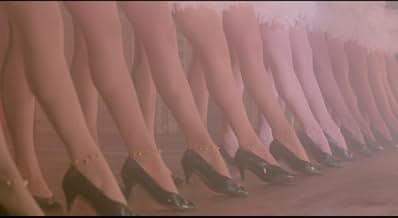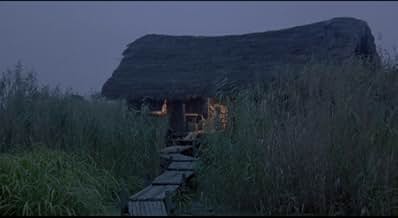IMDb RATING
7.1/10
6.3K
YOUR RATING
A provincial boy related to a Shanghai crime family is recruited by his uncle into cosmopolitan Shanghai in the 1930s to be a servant to a ganglord's mistress.A provincial boy related to a Shanghai crime family is recruited by his uncle into cosmopolitan Shanghai in the 1930s to be a servant to a ganglord's mistress.A provincial boy related to a Shanghai crime family is recruited by his uncle into cosmopolitan Shanghai in the 1930s to be a servant to a ganglord's mistress.
- Nominated for 1 Oscar
- 5 wins & 4 nominations total
- Director
- Writers
- All cast & crew
- Production, box office & more at IMDbPro
Featured reviews
First of all, I'm a huge fan of Gong Li.
"Shanghai Triad" one of my favourites out of her movies. 'Favourite' in my definition applies only when I want to watch a film again and again and liking it more everytime I watch it.
"Shanghai Triad" is a beautiful movie, with a clever plot developed within the time frame of a mere seven days. The depth of character also adds to the brilliance of the film. The character of "Xiao Jingbao" (sometimes translated as "Bijou") played by Gong Li at first seems shallow, as she is a chanteuse and moll of a powerful gangster. As her character develops, one recognises that underneath her materialistic values imposed upon her by society, lies a very pure nature. The discovery of the depth of her characterisation is especially moving, and propels towards an emotional climax, during which tragedy arouses sympathy and anguish.
The little boy in the movie is also noted for his excellent performance. He silently dominates the atmosphere of the film, looking on without speech, but secretly and strongly decided in the mind. He acts as the eye through which we see the world in the movie.
Apart from all the technical approval and standardised appraisal of the movie, I have to add I also loved Gong Li's singing in the movie. Yes, it was actually her singing! Her singing is just as beautiful as herself and her performances. Watch her dance and sing elegantly on stage, not one moment has she been not charming in the movie.
On the director's part, this is a very different film from all other previous Zhang Yimou films. But like all his other films, the story is meaningful and the cinematography is breath-taking.
Some more little background facts about the movie: during the making of the film, neither Gong Li nor director Zhang Yimou was in particularly good mood. And that was because, if you know about Gong Li and Zhang Yimou's relationship before, they broke up. Reason? Well, in short, Zhang Yimou's a workaholic, and Gong Li like any other woman, wanted security and family which he was unable to give. And interestingly, and sarcastically (in our point of view), there was a scene in the movie where Gong Li was chatting with the woman peasant. The peasant thought Gong Li was already married, but she said no. With surprise, the peasant said by this age she should be getting married. Gong Li said "Yes, I should be getting married. But do I know who to get married to?"
Of course Gong Li is married now, to a Singaporean business man.
Getting back to the movie, it's just a classic. It's visually absorbing, narratively ingenius, audibly satisfising, emotionally powerful, and just speechlessly amazing. If one can love a movie, I love this movie.
"Shanghai Triad" one of my favourites out of her movies. 'Favourite' in my definition applies only when I want to watch a film again and again and liking it more everytime I watch it.
"Shanghai Triad" is a beautiful movie, with a clever plot developed within the time frame of a mere seven days. The depth of character also adds to the brilliance of the film. The character of "Xiao Jingbao" (sometimes translated as "Bijou") played by Gong Li at first seems shallow, as she is a chanteuse and moll of a powerful gangster. As her character develops, one recognises that underneath her materialistic values imposed upon her by society, lies a very pure nature. The discovery of the depth of her characterisation is especially moving, and propels towards an emotional climax, during which tragedy arouses sympathy and anguish.
The little boy in the movie is also noted for his excellent performance. He silently dominates the atmosphere of the film, looking on without speech, but secretly and strongly decided in the mind. He acts as the eye through which we see the world in the movie.
Apart from all the technical approval and standardised appraisal of the movie, I have to add I also loved Gong Li's singing in the movie. Yes, it was actually her singing! Her singing is just as beautiful as herself and her performances. Watch her dance and sing elegantly on stage, not one moment has she been not charming in the movie.
On the director's part, this is a very different film from all other previous Zhang Yimou films. But like all his other films, the story is meaningful and the cinematography is breath-taking.
Some more little background facts about the movie: during the making of the film, neither Gong Li nor director Zhang Yimou was in particularly good mood. And that was because, if you know about Gong Li and Zhang Yimou's relationship before, they broke up. Reason? Well, in short, Zhang Yimou's a workaholic, and Gong Li like any other woman, wanted security and family which he was unable to give. And interestingly, and sarcastically (in our point of view), there was a scene in the movie where Gong Li was chatting with the woman peasant. The peasant thought Gong Li was already married, but she said no. With surprise, the peasant said by this age she should be getting married. Gong Li said "Yes, I should be getting married. But do I know who to get married to?"
Of course Gong Li is married now, to a Singaporean business man.
Getting back to the movie, it's just a classic. It's visually absorbing, narratively ingenius, audibly satisfising, emotionally powerful, and just speechlessly amazing. If one can love a movie, I love this movie.
The big plus here is in the visual department It is gorgeously filmed with deep, rich colors.
The story isn't that much. You keep excepting it to get better. It holds that promise but doesn't deliver until the ending, which has a neat no-nonsense twist. I really liked and admired that ending and wish more movies had realistic finishes like this.
Gong Li, who stars in here, plays a character that is interesting for the first half of the film but her spoiled-brat routine gets annoying after awhile. The main gangster, however, is an interesting guy throughout.
I've watched this twice and, frankly, expected more both times.
The story isn't that much. You keep excepting it to get better. It holds that promise but doesn't deliver until the ending, which has a neat no-nonsense twist. I really liked and admired that ending and wish more movies had realistic finishes like this.
Gong Li, who stars in here, plays a character that is interesting for the first half of the film but her spoiled-brat routine gets annoying after awhile. The main gangster, however, is an interesting guy throughout.
I've watched this twice and, frankly, expected more both times.
There has been way to much chatter about how beautiful this film is with its sumptuous sets, costumes, and magnificent photography. On the surface this looks like another gangster film, this time taking place in Shanghai. But of course, it isn't. The gangster scenario is just the backdrop really.
Shuisheng, a boy of 14, has come to the city to serve the haughty and beautiful Xiao Jingbao, the nightclub singing moll of Tang, head of the most powerful gang in Shanghai.
Shuisheng's uncle is a riot as he gives the boy a whacky set of instructions on how to be a proper servant to snobby Xiao, wonderfully played by Gong Li. "Call her 'Miss'. Follow her wherever she goes, not to far behind, and not to close. That's the rule. Hold her coat in your left hand and her hat in the right, but don't let the coat drag on the floor. That's the rule. Got it?" And the Shuisheng replies, "Got it." However, after "Miss" delights in calling him a country bumpkin, and chews him out a couple of times, (And why not, Shuisheng can't tell a red dress from a green one.) the kid starts looking for the exit. When his uncle tells him, "When she rings for you, stop everything (yes, everything) and go to her. Got it?" His reply this time is, "I want to leave." Bad move, uncle is most displeased.
In many ways, Shuisheng is the most inscrutable character in the movie. He's got a real poker face, and you'll probably have a tough time deciding if he's an idiot, or a sharp kid who's observing things closely and learning fast. This is the heart of the film, the relationship between the boy and the woman. Eventually, the boy will find out the self-important, hip swinging Xiao Jingbao is miserable. She is the beautiful songbird hopelessly trapped in a world where she is bathed in luxury by the ruthless Tang, with no hope of freedom.
The boy's whole attitude changes when he realizes this, and the question the film poses from here is ... what, if anything, can he do about it? If this was an American film, (and I'd love to see such a version) probably plenty, but director Yimou Zhang is a cynical man with a dark outlook on life. All his films have downbeat endings, and this one is no exception. What really bothers me though, is that events take place that result in a complete shift in setting half way through the film, and that's always a dangerous move in the cinema. And this abrupt shift comes at a time when things are just getting interesting in the nightclub, when Shuisheng realizes "Miss" is very unhappy. He might have been able to help her in the big city and spacious confines of the nightclub, but marooned on an island, there's not much he can do. This is a good film, but I would have liked to see the plot move in a different direction in the second half.
Shuisheng, a boy of 14, has come to the city to serve the haughty and beautiful Xiao Jingbao, the nightclub singing moll of Tang, head of the most powerful gang in Shanghai.
Shuisheng's uncle is a riot as he gives the boy a whacky set of instructions on how to be a proper servant to snobby Xiao, wonderfully played by Gong Li. "Call her 'Miss'. Follow her wherever she goes, not to far behind, and not to close. That's the rule. Hold her coat in your left hand and her hat in the right, but don't let the coat drag on the floor. That's the rule. Got it?" And the Shuisheng replies, "Got it." However, after "Miss" delights in calling him a country bumpkin, and chews him out a couple of times, (And why not, Shuisheng can't tell a red dress from a green one.) the kid starts looking for the exit. When his uncle tells him, "When she rings for you, stop everything (yes, everything) and go to her. Got it?" His reply this time is, "I want to leave." Bad move, uncle is most displeased.
In many ways, Shuisheng is the most inscrutable character in the movie. He's got a real poker face, and you'll probably have a tough time deciding if he's an idiot, or a sharp kid who's observing things closely and learning fast. This is the heart of the film, the relationship between the boy and the woman. Eventually, the boy will find out the self-important, hip swinging Xiao Jingbao is miserable. She is the beautiful songbird hopelessly trapped in a world where she is bathed in luxury by the ruthless Tang, with no hope of freedom.
The boy's whole attitude changes when he realizes this, and the question the film poses from here is ... what, if anything, can he do about it? If this was an American film, (and I'd love to see such a version) probably plenty, but director Yimou Zhang is a cynical man with a dark outlook on life. All his films have downbeat endings, and this one is no exception. What really bothers me though, is that events take place that result in a complete shift in setting half way through the film, and that's always a dangerous move in the cinema. And this abrupt shift comes at a time when things are just getting interesting in the nightclub, when Shuisheng realizes "Miss" is very unhappy. He might have been able to help her in the big city and spacious confines of the nightclub, but marooned on an island, there's not much he can do. This is a good film, but I would have liked to see the plot move in a different direction in the second half.
10cinescot
Gong-Li and film making partner Zhang Yimou have another fine hit; in a series that is beautiful filmmaking as well as one the government would find disapproving of the reality of triads.
She plays a "moll" , also a singing star triggering more than an ample reward for the conniving under bosses who would try to topple the boss.
Stunningly photographed and acted, maybe near the Hang Zhou coast (or a rare unfilled canal in Shanghai?) ... with his beautiful concubine, and the narrative device of a young male orphan as fellow observer; the Boss hits the mattresses due to an attempted murder from within; and retires to an island to discern the traitor giving orders to kill anyone who arrives or leaves the island without his permission.
Then the Boss waits, and Gong-Li idles no longer singing in the cabaret; and the "smoke out" begins.
Excellent poignant drama sensitively photographed.
As in all her films, and the directors, the people as bystanders and victims of any corruption is a subtle attended theme!
She plays a "moll" , also a singing star triggering more than an ample reward for the conniving under bosses who would try to topple the boss.
Stunningly photographed and acted, maybe near the Hang Zhou coast (or a rare unfilled canal in Shanghai?) ... with his beautiful concubine, and the narrative device of a young male orphan as fellow observer; the Boss hits the mattresses due to an attempted murder from within; and retires to an island to discern the traitor giving orders to kill anyone who arrives or leaves the island without his permission.
Then the Boss waits, and Gong-Li idles no longer singing in the cabaret; and the "smoke out" begins.
Excellent poignant drama sensitively photographed.
As in all her films, and the directors, the people as bystanders and victims of any corruption is a subtle attended theme!
A young boy is brought to 1930's Shanghai from the countryside to be the manservant of a gang boss's mistress. The mistress (Gong Li) is a glamourous nightclub singer and a royal bitch. Soon after he arrives, the boy is witness to a power play in the underworld that results in the uncovering of lots of treachery and quite a bit of violence.
It's a nicely constructed story with good acting from everybody involved. It's fairly straightforward, but satisfying, and seeing the gang land activity from the perspectives of two outsiders makes it all the more interesting.
SHANGHAI TRIAD became my favourite Zhang Yimou film when I saw it some years ago, for the simple reason that it was one of the most beautiful films I'd seen. The production design, costumes, lighting and camerawork are all quite remarkable - creating stunning images from the opulence of Shanghai's nightclubs and mansions to the simplicity of the rural island where the second half of the film takes place.
Unfortunately, the R1 DVD fails to do the film justice. The colours are far too subdued, giving the film a rather lifeless look, and the demon of the digital age, Edge Enhancement, rears its ugly head again. The result looks rather like a VHS transfer, but I'd swear in court that the film looked a lot better on my UK VHS copy (mainly because of the colours). Poor Zhang Yimou, he hardly ever seems to get good representation on DVD.
The film is recommended for fans of Zhang Yimou or Gong Li, though without the vibrant cinematography the film wouldn't be ranked as his best by many people. If you've already got the film on VHS, it's not worth "upgrading" to the DVD though.
It's a nicely constructed story with good acting from everybody involved. It's fairly straightforward, but satisfying, and seeing the gang land activity from the perspectives of two outsiders makes it all the more interesting.
SHANGHAI TRIAD became my favourite Zhang Yimou film when I saw it some years ago, for the simple reason that it was one of the most beautiful films I'd seen. The production design, costumes, lighting and camerawork are all quite remarkable - creating stunning images from the opulence of Shanghai's nightclubs and mansions to the simplicity of the rural island where the second half of the film takes place.
Unfortunately, the R1 DVD fails to do the film justice. The colours are far too subdued, giving the film a rather lifeless look, and the demon of the digital age, Edge Enhancement, rears its ugly head again. The result looks rather like a VHS transfer, but I'd swear in court that the film looked a lot better on my UK VHS copy (mainly because of the colours). Poor Zhang Yimou, he hardly ever seems to get good representation on DVD.
The film is recommended for fans of Zhang Yimou or Gong Li, though without the vibrant cinematography the film wouldn't be ranked as his best by many people. If you've already got the film on VHS, it's not worth "upgrading" to the DVD though.
Did you know
- TriviaThis was a difficult film for Yimou Zhang to make. His relationship with his leading lady Gong Li was coming to an acrimonious end and the Chinese authorities were deliberately hassling him with complicated and elusive work permits. That was mainly because they were still annoyed with him for submitting his previous film Vivre ! (1994) to the Cannes Film Festival without their permission.
- Quotes
Xiao Jingbao: [to Song] Just because you fucked me you think you're the boss?
- ConnectionsFeatured in 53rd Annual Golden Globe Awards (1996)
- How long is Shanghai Triad?Powered by Alexa
Details
- Release date
- Countries of origin
- Language
- Also known as
- Hội Tam Hoàng Thượng Hải
- Filming locations
- Shanghai, China(location)
- Production companies
- See more company credits at IMDbPro
Box office
- Gross US & Canada
- $2,086,101
- Opening weekend US & Canada
- $209,098
- Dec 25, 1995
- Gross worldwide
- $2,086,101
Contribute to this page
Suggest an edit or add missing content





























